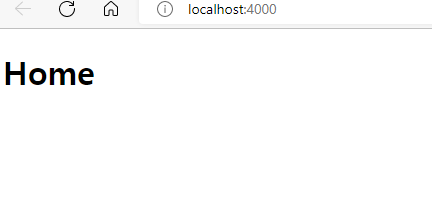고정 헤더 영역
상세 컨텐츠
본문
728x90
반응형
#5.1 Rendering Templates
- HTML template을 렌더링해볼 것이다.
- templates 폴더 안에 새로운 파일을 하나 만들 것이다.
- home.html을 만들자.
<!DOCTYPE html>
<html lang="en">
<head>
<meta charset="UTF-8">
<meta http-equiv="X-UA-Compatible" content="IE=edge">
<meta name="viewport" content="width=device-width, initial-scale=1.0">
<title>노마드 코인</title>
</head>
<body>
<h1>Home</h1>
</body>
</html>- 타이틀에 노마드 코인을 입력한다.
- body에 h1을 넣어보자.
- Go에서 template을 어떻게 렌더링하는가?
- 표준 library에 package가 이미 존재한다.
- package에서 불러오는 template이다. htmp의 text template가 아니다.
- 옵션이 많은데 ParseFiles()를 쓴다.

- 그럼 어떤 파일을 parse하고 싶은지 물어본다.
func home(rw http.ResponseWriter, r *http.Request) {
tmpl := template.ParseFiles("templates/home.html")
}- home.html을 parsing하고 싶으니 입력할 것이다.
- ParseFiles()는 template의 pointer와 error를 retrun한다.
- error도 처리해줘야한다.
- 해당 function은 template와 error 두 가지를 반환한다.
func home(rw http.ResponseWriter, r *http.Request) {
tmpl, err := template.ParseFiles("templates/home.html")
}- err을 써준다.
- Go언어에는 다른 Excepction이나 Error가 없으므로, 알아서 오류들을 처리해야 한다.
- 그렇기 때문에 function이 error을 반환한다.
- error을 어떻게 처리할 지 선택해야 한다.
if err != nil {
log.Fatal(err)
}- error가 존재하고 nil과 같지 않으면, 즉 아무것도 없는 상태가 아니면, error를 출력하고 프로그램을 os.Exit(1)으로 종료하겠다는 것이다.
- database를 다루게 되면 정말 많은 오류들을 만나게 되고, 이 코드를 계속해서 써줘야 한다.
- 그렇지만 이 코드를 계속 써야되는 건 아니다.
- utilities package등을 만들어보자.
- 그 utilities에 오류들을 처리하는 function들을 만들 것이다.
- 실제로 template을 excute해보자.
- tmpl.Excute()를 쓰고, 여기에는 두 가지 argument가 필요한데, 하나는 Response에 써줄 Writer이다.
- 그리고 다른 하나는 data이다. template에 전송할 data이다.
- template는 아무 data도 받고 있지 않다.
<!DOCTYPE html>
<html lang="en">
<head>
<meta charset="UTF-8">
<meta http-equiv="X-UA-Compatible" content="IE=edge">
<meta name="viewport" content="width=device-width, initial-scale=1.0">
<title>노마드 코인</title>
</head>
<body>
<h1>{{.pageTitle}}</h1>
</body>
</html>- pageTitle를 받아보자.
type homeData struct {
pageTitle string
}
func home(rw http.ResponseWriter, r *http.Request) {
tmpl, err := template.ParseFiles("templates/home.html")
if err != nil {
log.Fatal(err)
}
data := homeData{"Home}
tmpl.Execute(rw,data)
}- data를 써보자.
- struct를 만드자
- 그리고 여기에 data := homeData를 적고 pageTitle이 들어가야 하는데 Home이라고 적는다.
- template 뒤로 data를 보낼 수 있는지 확인하자.
- template내부에서는 pageTitle이라고 하는 variable 또는 field를 기다리고 있다.

- 아무것도 안나왔다.
type homeData struct {
PageTitle string
}<!DOCTYPE html>
<html lang="en">
<head>
<meta charset="UTF-8">
<meta http-equiv="X-UA-Compatible" content="IE=edge">
<meta name="viewport" content="width=device-width, initial-scale=1.0">
<title>노마드 코인</title>
</head>
<body>
<h1>{{.PageTitle}}</h1>
</body>
</html>- pageTitle은 소문자로 시작해서 아무데서도 공유되지 않았다.
- 대문자로 바꿔보자.

- 잘 나온다.
- 대/소문자 즉 private/public 속성은 templates 까지 영향을 준다.
- 전체 struct를 public로 할 필요는 없다. 다른 곳에서 homeData를 import하진 않는다.
- 하지만 PageTitle은 대문자가 되어야 한다.
- 이번에는 block을 렌더링해보자
- Blocks를 대문자로 쓰고, 이건 block pointer 배열이 될 것이다.
- block이 공유되고 있다.
- 그런데 여기에 문제가 있는데, blockchain.go를 보면 block struct는 공유되고 있지 않다.
type Block struct {
Data string
Hash string
PrevHash string
}- 이젠 공유할 시간이다.
- 모든 곳을 대문자로 고친다.
type homeData struct {
PageTitle string
Blocks []*blockchain.Block
}- blockchain.Block이라고 쓸 수 있다.
func home(rw http.ResponseWriter, r *http.Request) {
tmpl, err := template.ParseFiles("templates/home.html")
if err != nil {
log.Fatal(err)
}
data := homeData{"Home", blockchain.GetBlockchain().AllBlocks()}
tmpl.Execute(rw, data)
}- blockchain에 있는 모든 block을 갖다주는 function을 사용해야한다.
- AllBlocks이다.
- blockchain에서 block들을 불러온다.
- 기억해야 할 가장 중요한 내용은 *공유*되도록 한다. 그럴려면 대문자로 써야 한다.
- template utility를 하나 보자. 이 모든 걸 자동으로 해준다.
- template.Must라고 부른다.
- error를 가져오고 에러처리 코드를 쓰는 대신에 Must로 감싼다.
- 이건 Template나 error를 반환하는 function 호출을 감싸서 error가 있다면 Must funciton이 방금 했던 일을 도와준다.
- 오류가 있으면 error를 출력해준다.
- 오류가 없다면 Template pointer를 반환한다.

- Must fuctnion은 소스코드를 보면 우리가 방금 하고 있던걸 그대로 해준다.
func home(rw http.ResponseWriter, r *http.Request) {
tmpl := template.Must(template.ParseFiles("templates/home.html"))
data := homeData{"Home", blockchain.GetBlockchain().AllBlocks()}
tmpl.Execute(rw, data)
}- 여기 template pointer만 있고, 코드가 더 짧아졌다.
- for loop가 html의 모든 element를 순회하도록 하려면 어떻게 해야 하는가?
출처 : 노마드코더 노마드코인
728x90
반응형
'Go > Blockchain' 카테고리의 다른 글
| [Nomad Coin] Explorer - #5.3 Using Partials (0) | 2022.07.18 |
|---|---|
| [Nomad Coin] Explorer - #5.2 Rendering Templates (0) | 2022.07.17 |
| [Nomad Coin] Explorer - #5.0 Setup (0) | 2022.07.16 |
| [Nomad Coin] Blockchain - #4.5 Refactoring part Two (0) | 2022.07.16 |
| [Nomad Coin] Blockchain - #4.4 Refactoring part One (0) | 2022.07.16 |





댓글 영역